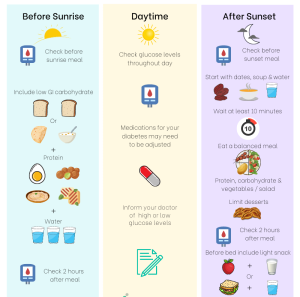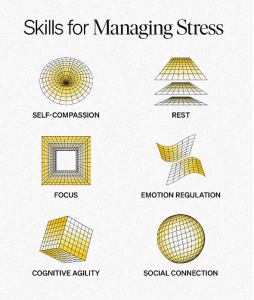Ramadan, in Islam, is the ninth month of the Muslim calendar and the holy month of fasting. It begins and ends with the appearance of the crescent moon.

According to Wikipedia, fasting from dawn to sunset is obligatory (for all adult Muslims who are not acutely or chronically ill, travelling, elderly, breastfeeding, diabetic, pregnant, or menstruating.
During this period, Muslims refrain from food, drink, tobacco products, sexual relations, and sinful behaviour, but devote themselves to prayer and study of the Quran.
It is said that the spiritual rewards of fasting are believed to be multiplied during Ramadan.
Below are the healthy ways to participate in Ramadan:
 Don’t skip Sahur: Suhur is a meal consumed early in the morning by Muslims before fasting. The meal is eaten before the Fajr prayer. Eating the right food choice for Sahur will help nourish your body and brain with the necessary nutrients to beat boredom during the day.
Don’t skip Sahur: Suhur is a meal consumed early in the morning by Muslims before fasting. The meal is eaten before the Fajr prayer. Eating the right food choice for Sahur will help nourish your body and brain with the necessary nutrients to beat boredom during the day.
Eat a balanced diet: Eating a balanced diet cannot be overemphasized. Make sure you eat sources of protein such as eggs, cheeses, chicken, fish, meat, and legumes for breakfast and Suhur along with starches, fresh or cooked vegetables, and fruits. Drink a sufficient amount of water from Iftar to Suhoor. Eat fruits as well.
 Eat moderately: Fasting does not necessarily mean you need to double up your portions of food to make up for missing daytime meals.
Eat moderately: Fasting does not necessarily mean you need to double up your portions of food to make up for missing daytime meals.
Avoid the temptation of overeating, especially when breaking your fast. If you overeat, you may experience indigestion, heartburn, and stomach cramps. Eat slowly, and in amounts appropriate for you.
Stay hydrated: Your body needs fluids. So, drink at least 10 glasses of water and eat hydrating foods such as soup, watermelon, and green salad. Avoid caffeinated drinks such as coffee, tea, and cola, because caffeine can make some people urinate more often, which may lead to dehydration. Keep drinking water between Iftar and Suhur.
 Get enough sleep: Try to sleep for at least four hours at night after Iftar, before waking for Suhur and Fajr – and return to sleep for a couple of hours before getting up for the day ahead. You can try to have a sleep schedule to prevent your body clock from being in shock due to waking up and sleeping at inconsistent hours. You may also take a short nap during noon in case you need a little bit of rest.
Get enough sleep: Try to sleep for at least four hours at night after Iftar, before waking for Suhur and Fajr – and return to sleep for a couple of hours before getting up for the day ahead. You can try to have a sleep schedule to prevent your body clock from being in shock due to waking up and sleeping at inconsistent hours. You may also take a short nap during noon in case you need a little bit of rest.
Stay physically active: Staying physically active will help to improve your health and well-being. Try to move as much as possible and to be active in the evenings, for example, by going for a regular daily walk.
 Manage stress: Engage in stress management techniques such as deep breathing, meditation, prayer, and spending time with loved ones to promote emotional well-being and reduce cortisol levels, which can affect hunger and digestion.
Manage stress: Engage in stress management techniques such as deep breathing, meditation, prayer, and spending time with loved ones to promote emotional well-being and reduce cortisol levels, which can affect hunger and digestion.
Practice cleanliness: Practice frequent hand washing, proper food handling, and keeping the food preparation area clean to avoid food-borne illnesses and gastrointestinal disorders during Ramadan.
Listen to your body: Pay attention to your body’s signals and adjust your fasting routine based on your feelings. It is important to prioritize your health, and maintain overall health and well-being.
 Consult your doctor: If you have pre-existing medical conditions or concerns about fasting, consult with your doctor to ensure that fasting is safe and suitable for you.
Consult your doctor: If you have pre-existing medical conditions or concerns about fasting, consult with your doctor to ensure that fasting is safe and suitable for you.


